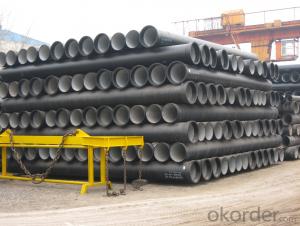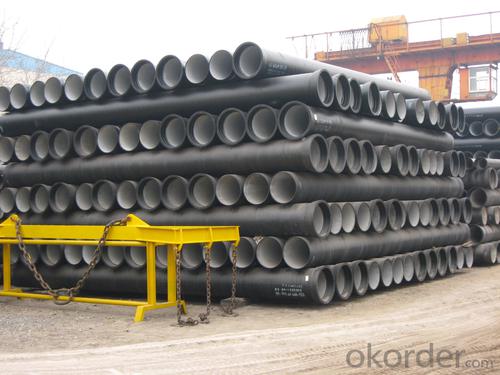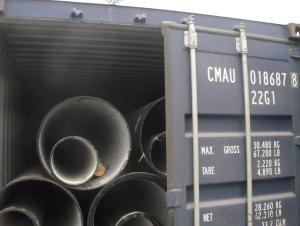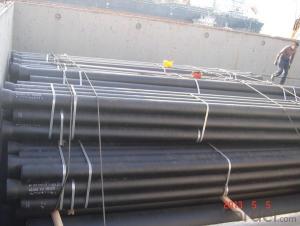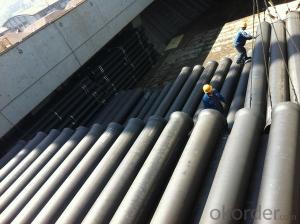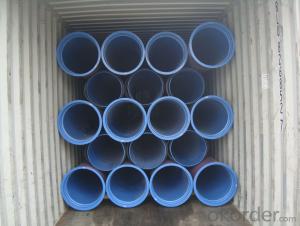T Type Ductile Iron Pipe DN100 c class SOCKET SPIGOT PIPE
- Loading Port:
- Tianjin
- Payment Terms:
- TT OR LC
- Min Order Qty:
- 200 m.t
- Supply Capability:
- 30000 m.t/month
OKorder Service Pledge
OKorder Financial Service
You Might Also Like
1) The standard of pipe: ISO2531:1998, EN545:2006,K9 K8
2) Effective length: 6m/5.7m
3) Inner cement line: Portland cement lineas per ISO4179
4) Zinc coating: at least 130g/m2 as per ISO8179
5) Bitumen painting: at least 70μm as per ISO8179
6)With 102% quantity of NBR, SBR, or EPDM ring asper ISO4633
7) DN80-DN1200
8) Highstrength, lighter than grey iron, good corrosion resistance, no furring, smallflow resistance, easy fixing, long life tome about 100 yeas
9)Checked by automatic inspection equipment
10) Composition:
Chemical composition | |||
Chemical composition | Ductile Cast Iron Pipe (%) | Grey iron pipe (%) | Steel pipe (%) |
C | 3.5-4.0 | 3.2-3.8 | 0.1-0.2 |
Si | 1.9-2.6 | 1.4-2.2 | 0.15-0.4 |
Mn | 0.15-0.45 | 0.4-0.6 | 0.3-0.6 |
P | ≤0.06 | ≤0.3 | 0.02-0.03 |
S | ≤0.02 | ≤0.1 | 0.02-0.03 |
Mg | 0.03-0.06 |
|
|
11) Feature:
Mechanical properties | |||
| Ductile Cast Iron Pipe | Grey Iron Pipe | Steel Pipe |
Tensile Strength(Mpa) | ≥420 | 150-260 | ≥400 |
Yield Strength(Mpa) | ≥300 | No Confirmation | No Confirmation |
Bending Strength(Mpa) | ≥590 | 200-360 | ≥400 |
Elongation (%) | ≥10 | Neglected | ≥18 |
Brinell Hardness(HBS) | ≤230 | ≤230 | About 140 |
12) T type mechanical joint
13) Packing: in bulk or container
PACKING: 1) Pipesare bundled together with the steel belt.
2) Wooden pieces are put between the pipes.
- Q: Are ductile iron pipes suitable for use in irrigation canals?
- Ductile iron pipes excel in irrigation canals due to their robustness and endurance. Their exceptional strength and durability make them an optimal selection for water transportation in irrigation systems. With remarkable tensile strength, they withstand the demanding loads and pressures regularly encountered in irrigation canals. Moreover, their remarkable corrosion resistance makes them an ideal fit for environments with varying water quality. Additionally, they possess resistance against UV rays and extreme weather conditions, guaranteeing their long lifespan within irrigation canal systems. Additionally, ductile iron pipes efficiently handle high flow rates, enabling efficient water transportation over extensive distances, ensuring effective irrigation. In summary, ductile iron pipes offer an array of advantages and are a trustworthy and fitting option for usage in irrigation canals.
- Q: How are ductile iron pipes restrained against axial thrust forces?
- Ductile iron pipes are restrained against axial thrust forces through a combination of mechanical restraints and soil resistance. One common method of restraining axial thrust forces is by using thrust blocks. Thrust blocks are concrete structures that are built at bends, tees, and other locations where changes in direction occur in the pipeline. These blocks are designed to resist the axial forces and prevent the pipes from shifting or moving due to the pressure exerted by the flowing fluid. Additionally, mechanical restraints such as pipe restraints, thrust collars, and anchor blocks are used to provide further support and prevent axial movement. Pipe restraints are devices that are installed around the pipe and connected to adjacent structures, such as walls or concrete collars, to prevent movement. Thrust collars are also used to absorb and distribute the thrust forces generated by the flowing fluid. These collars are typically made of ductile iron or steel and are secured around the pipe to resist axial movement. Furthermore, soil resistance plays a significant role in restraining axial thrust forces. The weight of the soil surrounding the pipe creates frictional resistance, which helps counteract the axial forces. Proper trench backfilling, compaction, and adequate embedment of the pipe in the soil are essential to ensure effective soil resistance. In summary, ductile iron pipes are restrained against axial thrust forces through a combination of mechanical restraints such as thrust blocks, pipe restraints, and thrust collars, as well as soil resistance provided by proper trench backfilling and compaction. This comprehensive approach ensures that the pipes remain securely in place and can withstand the axial forces generated by the fluid flowing through them.
- Q: Are ductile iron pipes suitable for use in wastewater pumping stations?
- Indeed, in wastewater pumping stations, ductile iron pipes exhibit suitability. Ductile iron, a resilient and robust substance, possesses the capacity to endure the demanding circumstances and corrosive properties of wastewater. With its exceptional resistance to corrosion and ability to withstand high-pressure settings, ductile iron pipes represent an optimal selection for the conveyance of wastewater within pumping stations. Notably, these pipes boast an extended lifespan and necessitate minimal maintenance, thereby reducing operational expenses and guaranteeing dependable and effective wastewater transportation.
- Q: What is the expected bedding and backfill requirements for ductile iron pipes?
- To ensure the longevity and proper functioning of ductile iron pipes, it is crucial to meet the expected bedding and backfill requirements. Although these pipes are known for their durability and strength, careful installation is still necessary to prevent any potential damage or compromised performance. The bedding requirements for ductile iron pipes entail establishing a stable and uniform support system to distribute the loads and stresses from the surrounding soil. The pipe should be surrounded by a bedding material that is devoid of rocks, debris, or any sharp objects that could potentially cause harm. Moreover, the bedding material should be adequately compacted to prevent settlement or shifting, which could result in misalignment or pipe failure. Typically, a granular material such as sand or fine aggregate is employed as the bedding material for ductile iron pipes, with a minimum thickness of 6 inches. This material should be evenly placed beneath and around the pipe to provide a continuous support system. Additionally, it should be compacted to at least 90% of the maximum dry density to ensure proper stability and load distribution. As for the backfill requirements, they pertain to the material used to fill the remaining space around the pipe after the bedding has been installed. Similar to the bedding material, the backfill material should be free from rocks, debris, or sharp objects to prevent damage. It should offer support and protection to the pipe while allowing for proper compaction and settling. The backfill material for ductile iron pipes typically consists of a granular substance such as sand or fine aggregate, with a maximum particle size of 1 inch. It should be placed and compacted in layers, ensuring that the compaction is uniform and even around the pipe. Sufficient compaction is crucial to avoid settlement or shifting of the backfill material, which could potentially harm or misalign the pipe. In conclusion, meeting the expected bedding and backfill requirements for ductile iron pipes necessitates the use of a granular material that is free from rocks, debris, or sharp objects. This material should be evenly placed and compacted to provide stable support and protection to the pipe. Adhering to these requirements will help ensure the proper functioning and longevity of ductile iron pipe systems.
- Q: Can ductile iron pipes be used for potable water systems?
- Yes, ductile iron pipes can be used for potable water systems. Ductile iron is a type of iron that has been treated with magnesium to increase its strength and flexibility. These pipes are known for their durability, corrosion resistance, and ability to withstand high pressure. They are commonly used in water distribution systems, including for potable water supply. However, it is important to ensure that the ductile iron pipes used for potable water systems meet the necessary standards and regulations set by local authorities, such as NSF/ANSI 61 for drinking water system components. Regular maintenance and periodic testing are also essential to ensure the continued safety and quality of the potable water system.
- Q: How does ductile iron pipe compare to steel pipe in terms of durability?
- Ductile iron pipe and steel pipe both have their own unique characteristics, but in terms of durability, ductile iron pipe has several advantages over steel pipe. Firstly, ductile iron pipe is highly resistant to corrosion. It has a protective layer of zinc or cement lining that prevents rust and corrosion, making it more durable and less prone to leaks or failures. On the other hand, steel pipe is susceptible to corrosion, especially when exposed to moisture or certain chemicals. This can lead to structural issues and decrease its overall durability. Secondly, ductile iron pipe has excellent impact resistance. It can withstand heavy loads and external pressures without cracking or breaking. This makes it suitable for applications in areas with high traffic or where the pipe may be subject to accidental impacts. Steel pipe, although strong, can be more brittle and prone to fractures under similar conditions. Additionally, ductile iron pipe has a longer service life compared to steel pipe. It has been known to last for over 100 years with proper maintenance, making it a reliable and durable choice for infrastructure projects. Steel pipe, while still durable, may require more frequent inspections and maintenance to ensure its longevity. Overall, ductile iron pipe surpasses steel pipe in terms of durability due to its corrosion resistance, impact resistance, and longer service life. However, the choice between the two ultimately depends on the specific application, budget, and other project requirements.
- Q: What is the average cost of ductile iron pipe?
- The average cost of ductile iron pipe can vary depending on several factors such as the diameter, length, and thickness of the pipe, as well as the supplier and location. On average, however, ductile iron pipe can range from approximately $40 to $200 per linear foot. It is important to note that these prices are estimates and can fluctuate based on market conditions and other variables. It is recommended to contact local suppliers or distributors for specific pricing information tailored to your project requirements.
- Q: What are the different types of thrust restraints for ductile iron pipe?
- There are several types of thrust restraints used for ductile iron pipe, including thrust blocks, tie rods, and anchor blocks. Thust blocks are concrete structures placed on either side of a bend or fitting to counteract the forces created by water pressure. Tie rods are steel rods that are anchored to the pipe and secured to an external structure, providing additional support against thrust. Anchor blocks are also made of concrete and are installed at regular intervals along the pipeline to prevent movement and absorb thrust forces.
- Q: Can ductile iron pipes be used for underground cable conduits?
- Ductile iron pipes are well-suited for underground cable conduits. They possess strength, durability, and corrosion resistance, making them suitable for a range of applications, including underground cable conduits. These pipes can handle heavy loads and safeguard cables against external elements. Furthermore, their long lifespan minimizes the need for frequent replacements and maintenance. Nonetheless, it is vital to consider factors like burial depth, soil conditions, and specific cable installation requirements when selecting ductile iron pipes for underground cable conduits.
- Q: Can ductile iron pipes be used for gas distribution networks?
- Yes, ductile iron pipes can be used for gas distribution networks.
Send your message to us
T Type Ductile Iron Pipe DN100 c class SOCKET SPIGOT PIPE
- Loading Port:
- Tianjin
- Payment Terms:
- TT OR LC
- Min Order Qty:
- 200 m.t
- Supply Capability:
- 30000 m.t/month
OKorder Service Pledge
OKorder Financial Service
Similar products
Hot products
Hot Searches
Related keywords
